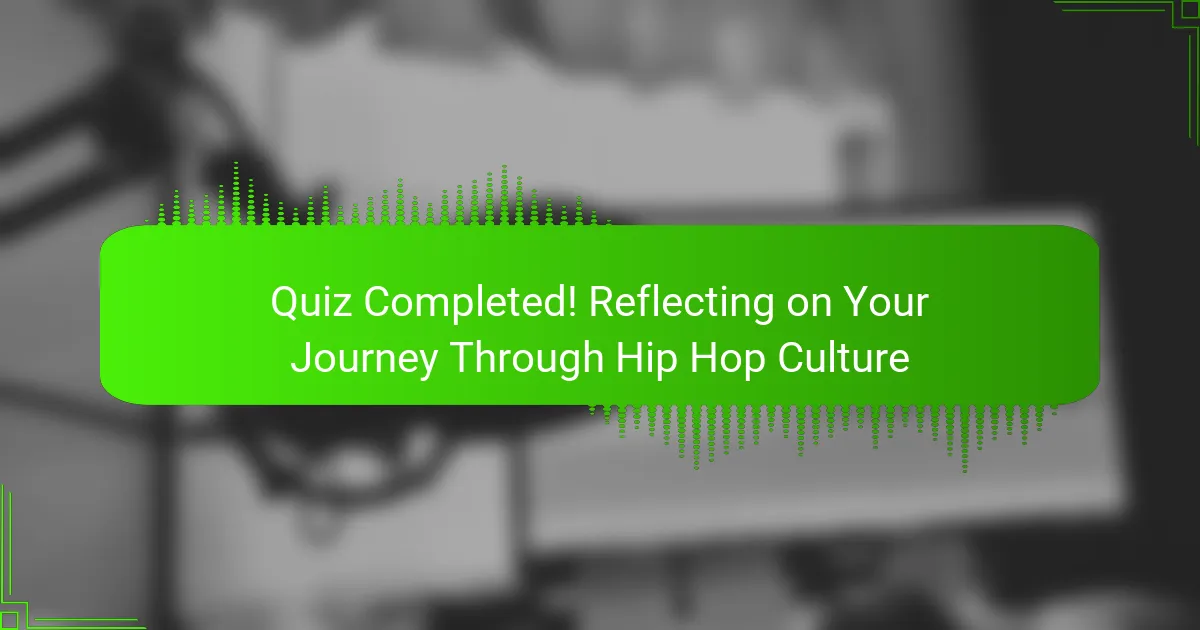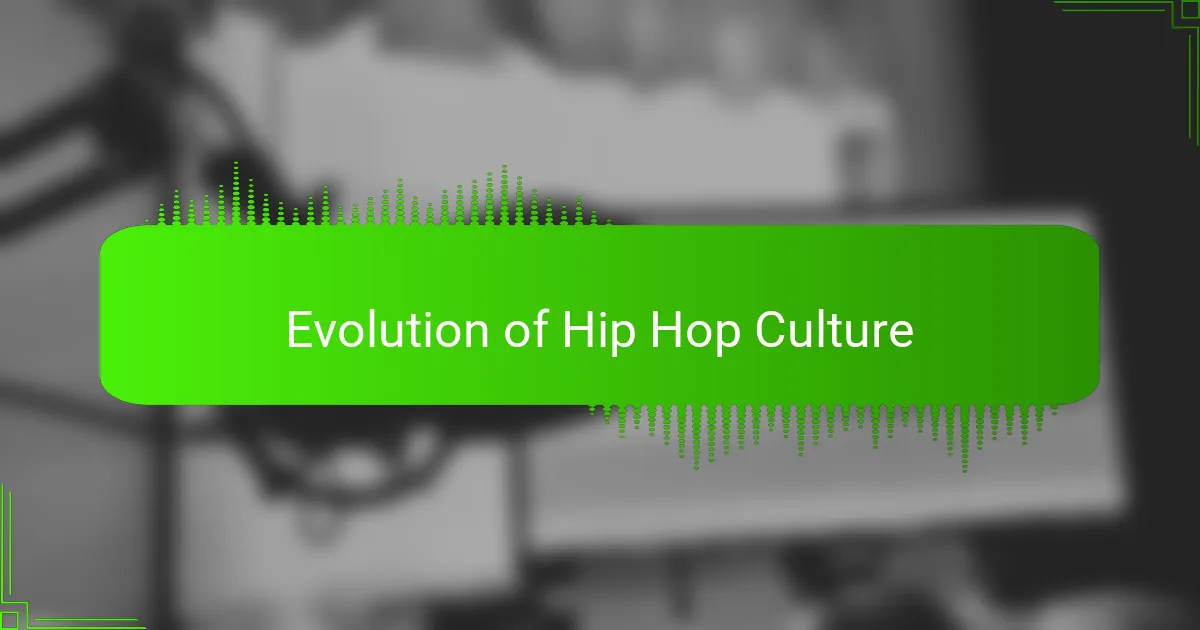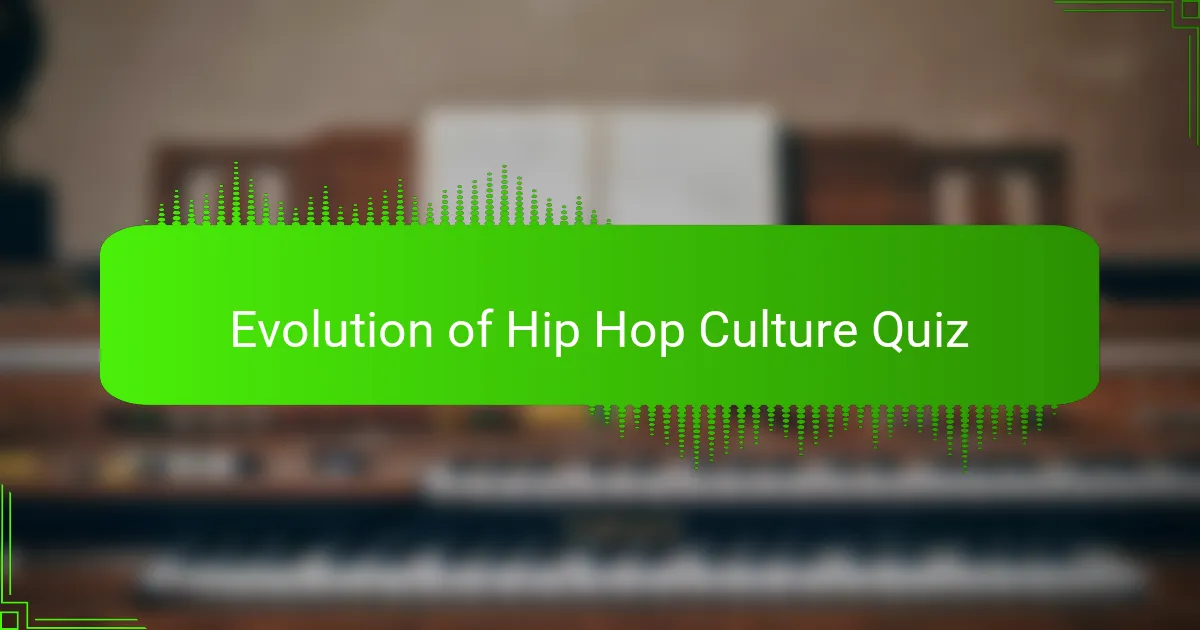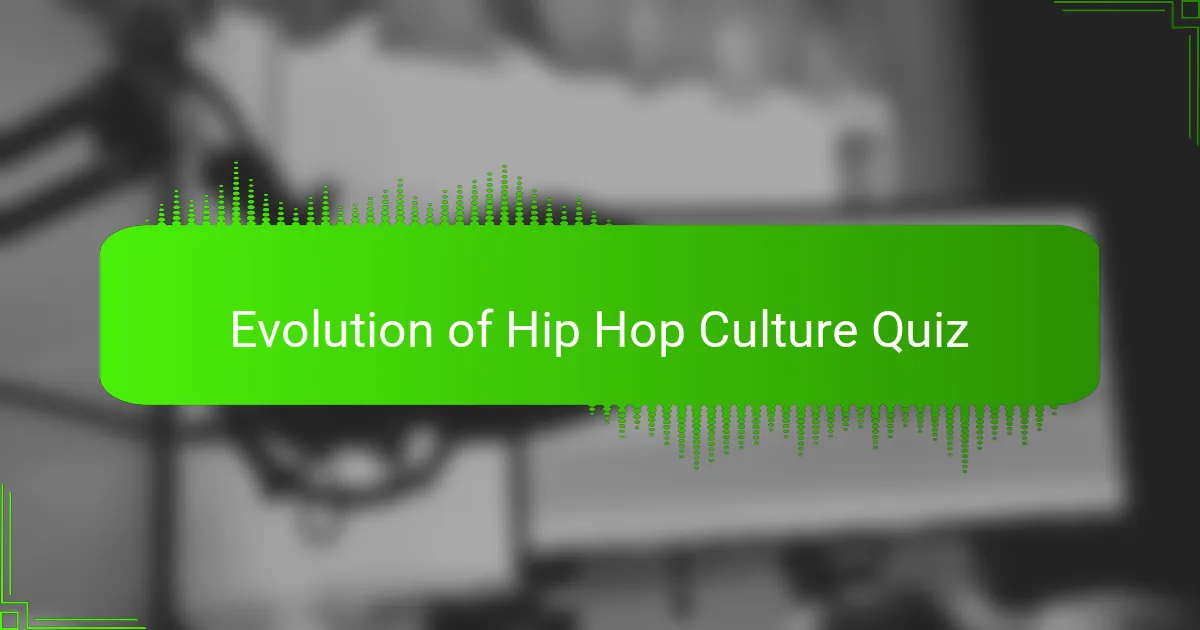
Quiz Completed! Reflecting on Your Journey Through Hip Hop Culture
Congratulations on completing our quiz on the evolution of hip hop culture! We hope you found the experience both enlightening and enjoyable. Through your answers, you’ve likely discovered key milestones and influential figures who have shaped this vibrant genre. Understanding these aspects enriches your appreciation of hip hop’s impact on society and its continuous growth.
Quizzes like this allow us to engage with the music we love on a deeper level. You may have learned about the diverse elements that contribute to hip hop, from its roots in oral traditions to its modern digital presence. These insights not only enhance your musical knowledge but also foster a greater understanding of the cultural significance behind the beats and rhymes.
We invite you to explore the next section on this page, which delves further into the evolution of hip hop culture. Here, you’ll find a wealth of information that expands on the themes introduced in the quiz. Dive in and continue your journey through the rhythmic world of hip hop—there’s always something new to learn!

Evolution of Hip Hop Culture
Origins of Hip Hop Culture in the 1970s
Hip hop culture emerged in the 1970s in the South Bronx, New York City. Pioneering figures include DJ Kool Herc, who is credited with developing breakbeat DJing, and Grandmaster Flash, who advanced techniques like cutting and scratching. This era laid the groundwork for hip hop through block parties, where DJs played music that brought local youth together. The culture encompassed four main elements: rapping (MCing), DJing, graffiti art, and breakdancing. The genre’s roots reflect a response to the socio-economic conditions faced by marginalized communities.
The Golden Age of Hip Hop in the 1980s and 1990s
The Golden Age of hip hop is often considered to span the late 1980s to the mid-1990s. This period saw the rise of influential artists like Run-D.M.C., Nas, and A Tribe Called Quest, who pushed creative boundaries. Lyrical complexity, political themes, and innovative sounds characterized this era. Labels like Def Jam and Priority Records played pivotal roles in promoting this new music. Additionally, the development of hip hop sub-genres, including gangsta rap, emerged with figures like N.W.A promoting voices from inner-city struggles.
The Influence of Mainstream Media on Hip Hop
Mainstream media began to embrace hip hop in the late 1990s, significantly impacting its evolution. Shows like “Yo! MTV Raps” introduced artists such as Snoop Dogg and Missy Elliott to wider audiences. Additionally, films like “8 Mile” showcased hip hop’s culture, further bridging the gap between the genre and mainstream audiences. Major record labels recognized hip hop’s commercial viability, leading to increased sales and chart-topping hits. This exposure helped transform hip hop from an underground movement to a dominant cultural force.
The Digital Revolution and the Rise of Social Media
The advent of the Internet and social media transformed hip hop in the early 2000s. Platforms like YouTube and SoundCloud enabled artists like Chance the Rapper and Lil Nas X to gain popularity without traditional record labels. These platforms allowed for direct engagement between artists and their fans. The rise of digital distribution reshaped how music is consumed, with streaming services like Spotify becoming primary distribution channels. This shift has made it easier for diverse voices within hip hop to emerge and flourish.
Globalization of Hip Hop Culture
Hip hop has evolved into a global phenomenon, transcending geographic boundaries. Artists worldwide have embraced hip hop’s foundational elements, blending local cultures with the genre. Notable figures include French rapper MC Solaar and South Korean group BTS, which incorporates hip hop elements into their music. This globalization creates a melting pot of styles and influences, fostering cultural exchange. Festivals and collaborations across continents showcase hip hop’s adaptability and relevance in global pop culture.
What is the origin of Hip Hop culture?
Hip Hop culture originated in the 1970s in the South Bronx, New York City. It emerged as a response to the socioeconomic conditions of the area. Key elements include rapping, DJing, breakdancing, and graffiti art. DJ Kool Herc is often credited as one of the founders, using two turntables to create extended breaks for dancers. This innovation laid the groundwork for the musical aspect of Hip Hop.
How did Hip Hop music evolve over the decades?
Hip Hop music evolved significantly from the 1970s to the 2020s. In the 1980s, it shifted from party anthems to more complex lyrical themes, with artists like Run-D.M.C. and Public Enemy addressing social issues. The 1990s introduced subgenres such as gangsta rap, exemplified by Tupac Shakur and The Notorious B.I.G. By the 2000s and 2010s, Hip Hop embraced diverse influences, incorporating elements of pop, electronic, and trap music, with artists like Drake and Kendrick Lamar pushing the genre’s boundaries.
Where is Hip Hop culture most influential today?
Hip Hop culture is most influential in urban areas around the globe, particularly in North America, Europe, and Africa. Major cities like New York, Los Angeles, Paris, and Johannesburg have thriving Hip Hop scenes. The influence extends to fashion, film, and social movements, with the genre shaping trends and conversations worldwide. Platforms like Spotify and Apple Music have further amplified this global reach.
When did Hip Hop become a mainstream music genre?
Hip Hop became a mainstream music genre in the late 1980s to early 1990s. The release of albums like “Licensed to Ill” by Beastie Boys in 1986 and “Straight Outta Compton” by N.W.A. in 1988 marked significant milestones, bringing the genre to wider audiences. By the 1990s, Hip Hop dominated charts and became a cultural force, evidenced by the Grammy Awards recognizing it more prominently.
Who are the key figures in the history of Hip Hop culture?
Key figures in the history of Hip Hop culture include DJ Kool Herc, who is recognized as a pioneer; Afrika Bambaataa, who helped establish Hip Hop as a cultural movement; and Grandmaster Flash, known for his innovative DJ techniques. In later years, influential artists like Tupac Shakur, The Notorious B.I.G., Jay-Z, and Eminem have played crucial roles in its popularity. Their contributions have shaped the genre and its cultural impact significantly.

